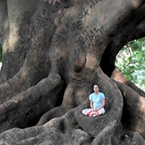 Judy Lief teaches us the practice of tonglen – a mindfulness technique that intakes the suffering of others and replaces it with compassion.
Judy Lief teaches us the practice of tonglen – a mindfulness technique that intakes the suffering of others and replaces it with compassion.
Each time you practice tonglen, begin with basic mindfulness practice. It is important to take some time to let your mind settle. Having done so, you can go on to the practice of tonglen itself, which has four steps.
The first step is very brief. You could think of it as “clearing the decks.” You simply allow a little pause, or gap, before you begin. Although this first step is very brief and simple, it is still important. It is like cracking the window to let in a little fresh air.
In the second step you touch in with the visceral world of feelings and emotions. Each time you breathe in, you breath in heavy, dark, hot, sticky, claustrophobic energy; and each time you breathe out, you breathe out light, refreshing, clear, cool energy. With each breath the practice shifts direction, so there is an ongoing rhythm back and forth. You are taking the habit of grasping and rejecting and you are reversing it.
The third and fourth steps take that same approach and apply it to specific topics. Start as close to home as possible, with something that actually affects you personally. You should work with a topic that arouses real feelings, something that actually touches you or feels a little raw. It does not need to be anything monumental; it could be quite ordinary. For instance, maybe someone screamed at you when you were driving to work. You could breathe in the aggression they threw at you and you could breathe out to that person a wish to free them from the pain of that anger. If you yourself have just come down with a sickness, you could breathe in that sickness, and breathe out your feeling of health and well-being. The point is to start with something that has some reality or juice in your life.
Once you are underway, it is good to let the practice develop on its own and see where it takes you. In this case, no matter what comes up in your mind, you breathe in what you do not like and you breathe out what you do, or you breathe in what is not so good and breathe out being free of that. For instance, after you breathe in that driver’s aggression and breathe out your soothing of that anger, what might come up next is your own anger at being so abused first thing in the morning when you had started out in a pretty good mood. You could breathe that anger in and breathe out the ability not to take such attacks so personally. In that way your thoughts follow along naturally, revealing more and more subtle layers of grasping and rejecting.
In the fourth step you expand the practice beyond your own immediate feelings and concerns of the moment. For instance, if you are worried about your friend, you expand that concern to include all the other people now and in the past who have had similar worries. You include everybody who has suffered the pain of seeing someone they are close to in danger or trouble. You breathe in all those worries and breathe out to all those countless beings your wish that they be freed from such pain.
Tonglen practice is a radical departure from our usual way of going about things. It may seem threatening, and even crazy; but it strikes at a very core point—how we barricade ourselves from pain and lose our connection with one another. The irony is that the barricades we create do not help all that much; they just make things worse. We end up more fearful, less willing to extend ourselves, and stunted in our ability to express any true kindness. Tonglen pokes holes in those barricades that we create.
Tonglen is always about connection: making a genuine connection with ourselves and others. It is a practice that draws us out beyond our own concerns to an appreciation that no matter what we happen to be going through, others too have gone through experiences just as intense. In tonglen we are continually expanding our perspective beyond our small self-preoccupied world. The less we restrict our world, the more of it we can take in—and at the same time, we find that we also have much more to give.
